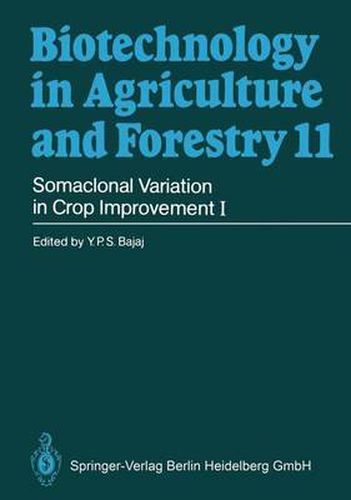Readings Newsletter
Become a Readings Member to make your shopping experience even easier.
Sign in or sign up for free!
You’re not far away from qualifying for FREE standard shipping within Australia
You’ve qualified for FREE standard shipping within Australia
The cart is loading…






This title is printed to order. This book may have been self-published. If so, we cannot guarantee the quality of the content. In the main most books will have gone through the editing process however some may not. We therefore suggest that you be aware of this before ordering this book. If in doubt check either the author or publisher’s details as we are unable to accept any returns unless they are faulty. Please contact us if you have any questions.
Genetic erosions in plant cell cultures, especially in chromosome number and ploidy level, have now been known for over 25 years. Until the mid -1970ssuch changes were consideredundesirable and thereforediscarded because the main emphasis wason clonal propagation and genetic stability of cultures. However, since the publication on somaclonal variation by Larkin and Scowcroft (1981) there has been a renewed interest to utilize these in vitro obtained variations for crop improvement. Studies conduc- ted during the last decade have shown that callus cultures, especially on peridical subculturing over an extended period of time, undergo morpho- logical and genetic changes, i. e. polyploidy, aneuploidy, chromosome breakage, deletions, translocations, gene amplification, inversions, muta- tions, etc. In addition, there are changes at the molecular and biochemical levelsincluding changes in the DNA, enzymes,proteins, etc. Suchchanges are now intentionally induced, and useful variants are selected. For instance in agricultural crops such as potato, tomato, tobacco, maize, rice and sugarcane, plants showing tolerance to a number of diseases, viruses, herbicides and salinity, have been isolated in cell cultures. Likewise induction of male sterility in rice, and wheat showing various levels of fer- tility and gliadin, have been developed in vitro. These academic excercises open new avenues for plant breeders and pathologists. Another area of tremendous commercial importance in the pharmaceuti- cal industry is the selection of cell lines showing high levels of medicinal and industrial compounds. Already high shikonin containing somaclones in Lithospermum are being used commercially.
$9.00 standard shipping within Australia
FREE standard shipping within Australia for orders over $100.00
Express & International shipping calculated at checkout
This title is printed to order. This book may have been self-published. If so, we cannot guarantee the quality of the content. In the main most books will have gone through the editing process however some may not. We therefore suggest that you be aware of this before ordering this book. If in doubt check either the author or publisher’s details as we are unable to accept any returns unless they are faulty. Please contact us if you have any questions.
Genetic erosions in plant cell cultures, especially in chromosome number and ploidy level, have now been known for over 25 years. Until the mid -1970ssuch changes were consideredundesirable and thereforediscarded because the main emphasis wason clonal propagation and genetic stability of cultures. However, since the publication on somaclonal variation by Larkin and Scowcroft (1981) there has been a renewed interest to utilize these in vitro obtained variations for crop improvement. Studies conduc- ted during the last decade have shown that callus cultures, especially on peridical subculturing over an extended period of time, undergo morpho- logical and genetic changes, i. e. polyploidy, aneuploidy, chromosome breakage, deletions, translocations, gene amplification, inversions, muta- tions, etc. In addition, there are changes at the molecular and biochemical levelsincluding changes in the DNA, enzymes,proteins, etc. Suchchanges are now intentionally induced, and useful variants are selected. For instance in agricultural crops such as potato, tomato, tobacco, maize, rice and sugarcane, plants showing tolerance to a number of diseases, viruses, herbicides and salinity, have been isolated in cell cultures. Likewise induction of male sterility in rice, and wheat showing various levels of fer- tility and gliadin, have been developed in vitro. These academic excercises open new avenues for plant breeders and pathologists. Another area of tremendous commercial importance in the pharmaceuti- cal industry is the selection of cell lines showing high levels of medicinal and industrial compounds. Already high shikonin containing somaclones in Lithospermum are being used commercially.